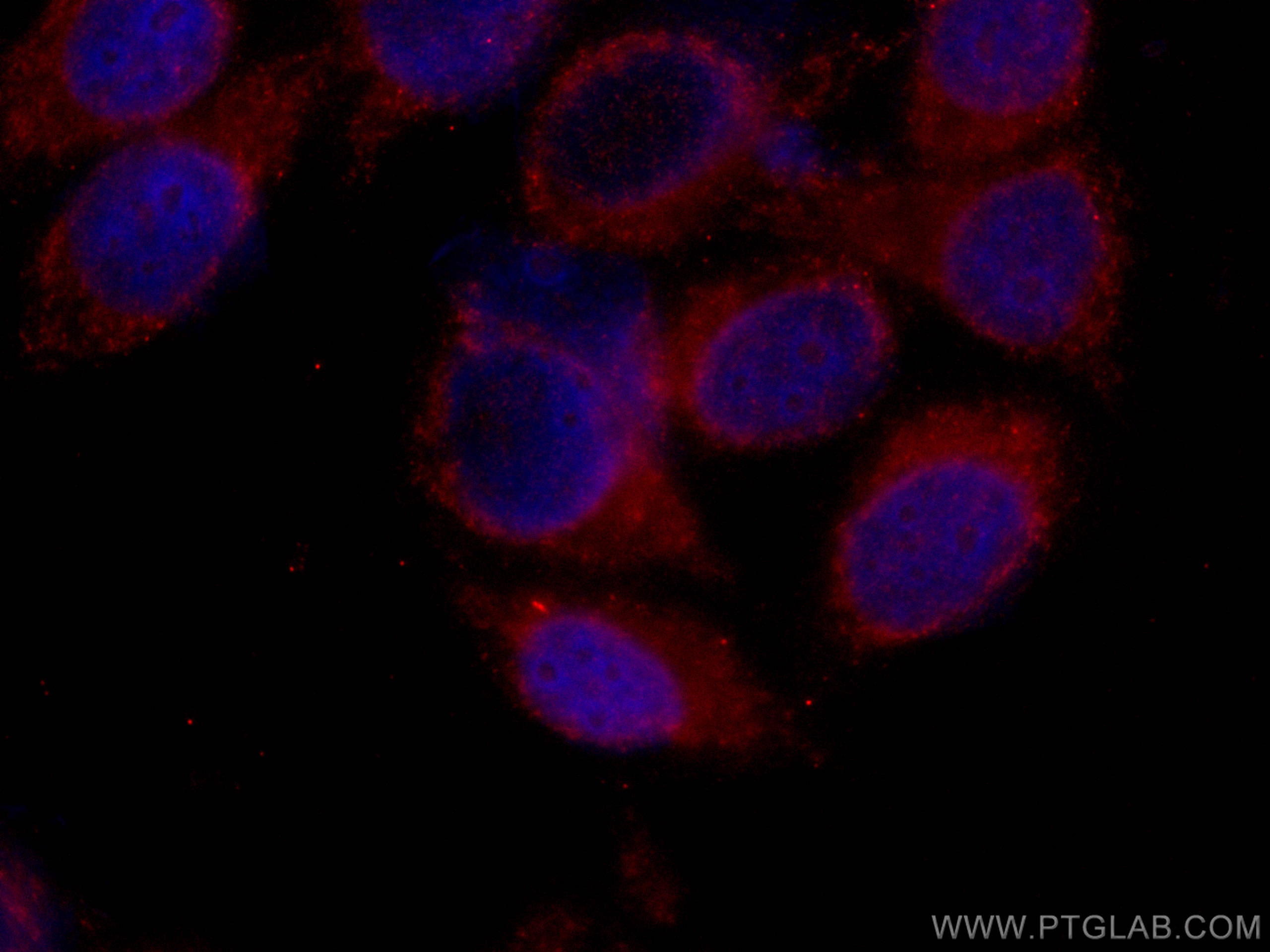Tested Applications
| Positive IF/ICC detected in | HepG2 cells |
Recommended dilution
| Application | Dilution |
|---|---|
| Immunofluorescence (IF)/ICC | IF/ICC : 1:50-1:500 |
| It is recommended that this reagent should be titrated in each testing system to obtain optimal results. | |
| Sample-dependent, Check data in validation data gallery. | |
Product Information
CL594-67208 targets IFIT3 in IF/ICC applications and shows reactivity with Human samples.
| Tested Reactivity | Human |
| Host / Isotype | Mouse / IgG2a |
| Class | Monoclonal |
| Type | Antibody |
| Immunogen |
CatNo: Ag7518 Product name: Recombinant human IFIT3 protein Source: e coli.-derived, PET28a Tag: 6*His Domain: 141-490 aa of BC004977 Sequence: EEGWTQLKCGRNERAKVCFEKALEEKPNNPEFSSGLAIAMYHLDNHPEKQFSTDVLKQAIELSPDNQYVKVLLGLKLQKMNKEAEGEQFVEEALEKSPCQTDVLRSAAKFYRRKGDLDKAIELFQRVLESTPNNGYLYHQIGCCYKAKVRQMQNTGESEASGNKEMIEALKQYAMDYSNKALEKGLNPLNAYSDLAEFLETECYQTPFNKEVPDAEKQQSHQRYCNLQKYNGKSEDTAVQHGLEGLSISKKSTDKEEIKDQPQNVSENLLPQNAPNYWYLQGLIHKQNGDLLQAAKCYEKELGRLLRDAPSGIGSIFLSASELEDGSEEMGQGAVSSSPRELLSNSEQLN Predict reactive species |
| Full Name | IFIT3 |
| Calculated Molecular Weight | 56 kDa |
| Observed Molecular Weight | 60 kDa |
| GenBank Accession Number | BC004977 |
| Gene Symbol | IFIT3 |
| Gene ID (NCBI) | 3437 |
| RRID | AB_2920096 |
| Conjugate | CoraLite®594 Fluorescent Dye |
| Excitation/Emission Maxima Wavelengths | 588 nm / 604 nm |
| Excitation Laser | Yellow-Green Laser (561 nm) |
| Form | Liquid |
| Purification Method | Protein A purification |
| UNIPROT ID | O14879 |
| Storage Buffer | PBS with 50% glycerol, 0.05% Proclin300, 0.5% BSA, pH 7.3. |
| Storage Conditions | Store at -20°C. Avoid exposure to light. Stable for one year after shipment. Aliquoting is unnecessary for -20oC storage. |
Background Information
IFIT3 (IFN-induced protein with tetratricopeptide repeats 3), also known as IFIT-4, ISG-60 or RIG-G, is a 56 kDa IFN induced protein. IFIT3 has been identified to be associated with strong IFN antiviral activity. Upon RNA virus infection, IFIT3 is significantly induced, ectopic expression or knockdown of IFIT3 could, respectively, enhance or impair IFN regulatory factor 3 (IRF3)-mediated gene expression. IFIT3 thus may serve as an important modulator in innate immunity, revealing a new function of the IFIT family proteins.
Protocols
| Product Specific Protocols | |
|---|---|
| IF protocol for CL594 IFIT3 antibody CL594-67208 | Download protocol |
| Standard Protocols | |
|---|---|
| Click here to view our Standard Protocols |




